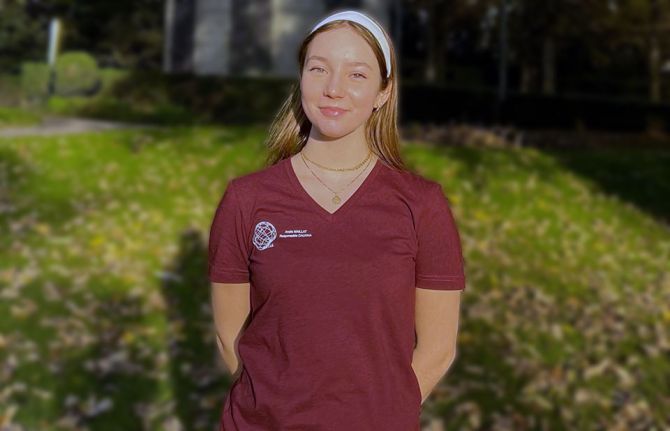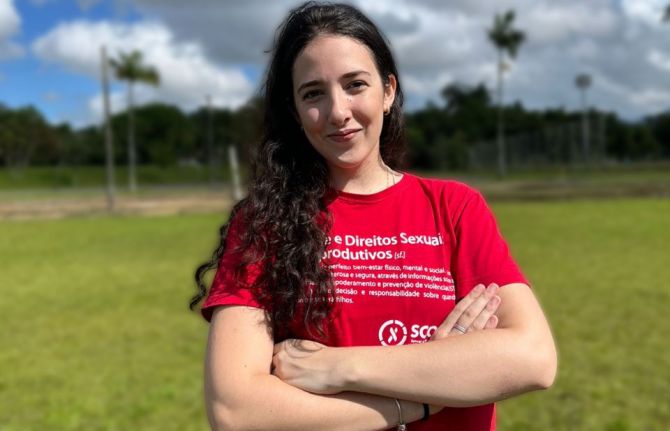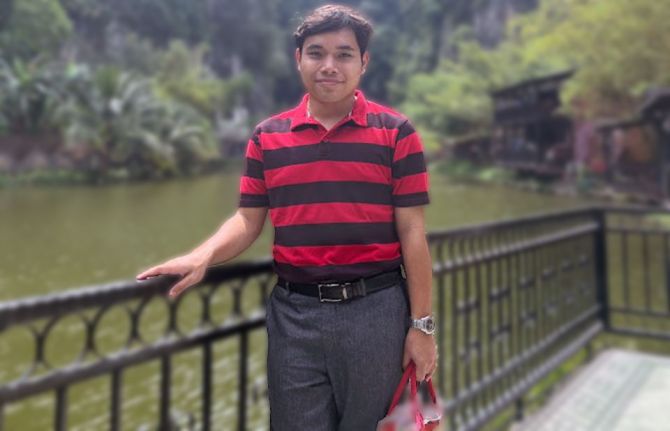



Feature Story
Future doctors take active role in HIV response to end AIDS
28 August 2023
28 August 2023 28 August 2023Medical student Anaïs Maillat, 21, joined METIS (Movement of The Students Against Inequalities in Health Access) for a simple reason. The children’s beaming smiles drew her in.
As a member organization of the International Federation of Medical Students Association (IFMSA), the Swiss Medical Students Association (SWIMSA) Switzerland, launched the program CALWHA which works with children and adolescents living with HIV and AIDS in Tanzania.
Ms. Maillat focused on the Mwanza region where the rate of HIV infection is higher than the national average as its project coordinator.
“Our project is currently helping more than 400 children living with HIV and AIDS,” she said. “We organize activity days in hospitals where children and adolescents get check-ups, medicine, a meal, educational activities, and a safe space to play,” she added.
Activity days are held on three Saturdays of each month for children and adolescents aged 0 – 19 years old to improve clinic attendance and treatment adherence. “For many children, the hospital is far, so parents miss work, which has a cost,” Ms. Maillat explained. The project pays for people’s transportation to the hospital and that help allows many children to stay on treatment, according to CALWHA.
Like Ms. Maillat, medical students worldwide are taking an active role in the HIV response in their native countries.
Ana Laura Nascimento, a 21-year-old medical student and member of IFMSA Brazil, became an advocate for sexual and reproductive health rights through Pense Positivo, a project that organizes HIV awareness activities for houseless individuals and sex workers.
During her school years, Ms. Nascimento said she realized there was a clear demand to educate her peers about sex due to sexually transmitted infection (STI) outbreaks. “We organized Testar é Saber (“testing is knowing”), a campaign to encourage students to get tested for HIV, syphilis, hepatitis B and C,” she said.
That led to information sessions at the university including doctors, public health professionals, and the municipality. As a result, the school now offers testing events twice a year.
Ms. Nascimento went on to lead and become a member of IFMSA Brazil’s National Officers for Sexual and Reproductive Health (NORA).
In Malaysia, another NORA leader, Joseph Hamzah Anwar, is a 25-year-old medical student and a member of Society of MMA Medical Students. He became an outreach worker for People Like Us Hang Out (PLUHO) - an LGBTQ organization based in Kuala Lumpur, Malaysia that focuses on mental health.
“I met doctors who are not sensitized to issues that HIV comes with and this discourages clients from seeking treatment,” he said. In his view, the younger generation of doctors need to be aware and knowledgeable, so people stay on HIV treatment and live their lives like any other person.
As members of IFMSA, these future doctors have been organizing activities with communities as part of the organization’s aim to strengthen its involvement in the HIV response. They also seek to educate the public about HIV and AIDS and reduce stigma and discrimination in all healthcare facilities.
Representing more than a million medical students as their members, IFMSA also contributes to the Global Partnership to End All Forms of HIV-Related Stigma and Discrimination and holds a leadership role in The PACT, a global coalition of youth-led organizations advocating for sexual and reproductive health rights.
On August 24, IFMSA, with the International Pharmaceutical Students’ Federation (IPSF) launched a Declaration of Commitment to HIV and AIDS. The Declaration will guide IFMSA and IPSF in their future efforts to contribute to the AIDS response.
All three future doctors hope that the declaration will encourage others to join the global youth movement to end AIDS. “With the activities outlined in the declaration, I believe we are on the right track to end AIDS by 2030,” Mr. Anwar said.
“I truly believe that young people have the potential to unite to end AIDS,” Ms. Maillat said. “We are the generation of unity. Let’s do this. You and me.”
Related
 U=U can help end HIV stigma and discrimination. Here’s how
U=U can help end HIV stigma and discrimination. Here’s how

27 February 2025


